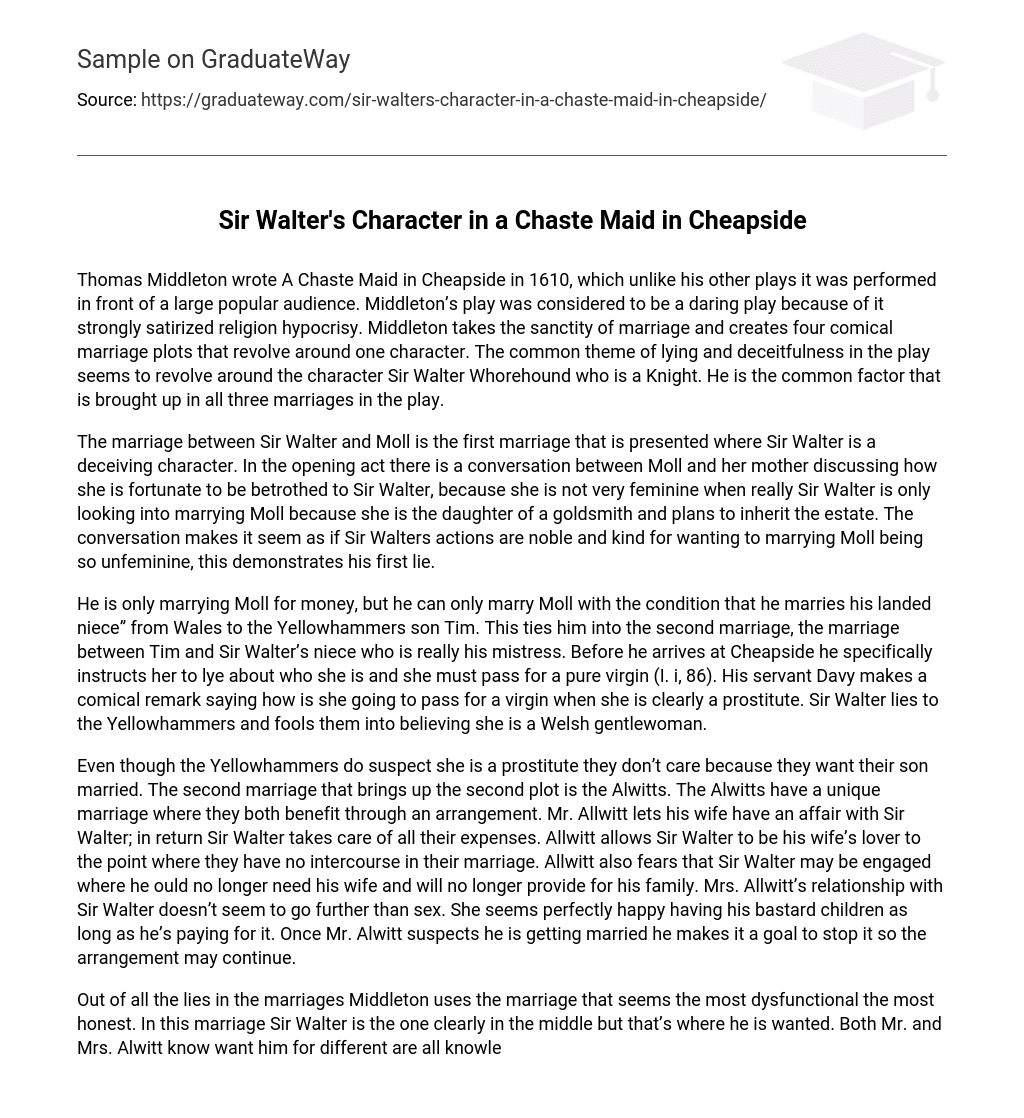Thomas Middleton’s A Chaste Maid in Cheapside, written in 1610, stands out among his other plays as it was performed before a sizable and enthusiastic audience. The play boldly critiques religious hypocrisy, using the institution of marriage to weave together four humorous plotlines centered around a single character. Lying and deceitfulness serve as recurring themes throughout the play, with Sir Walter Whorehound, a Knight, being the central figure connecting all three marriages.
The marriage of Sir Walter and Moll is the initial instance in which Sir Walter is depicted as a deceptive character. In the beginning, Moll and her mother converse about how lucky Moll is to be engaged to Sir Walter, despite her lack of femininity. However, the truth is that Sir Walter is only interested in marrying Moll because she is the daughter of a goldsmith and stands to inherit the estate. This conversation creates the illusion that Sir Walter’s intentions are honorable and compassionate, despite being untrue, thereby manifesting his first lie.
The text suggests that the protagonist is entering into a marriage with Moll solely for financial gain. However, the condition of this marriage is that he must also facilitate a marriage between his relative from Wales, Tim, and Sir Walter’s niece, who is actually his mistress. Before arriving at Cheapside, the protagonist specifically instructs his mistress to lie about her identity and pretend to be a pure virgin. His servant, Davy, humorously questions how she can pass as a virgin when she is clearly a prostitute. The protagonist deceives the Yellowhammers by pretending that his mistress is a respectable woman from Wales.
The Yellowhammers are unconcerned about the suspicion that their son’s bride may be a prostitute, as they are primarily focused on getting him married. Another plot involving the Alwitts arises, in which they have a unique arrangement for their marriage. Mr. Allwitt allows his wife to have an affair with Sir Walter, who in turn takes care of their expenses. Allwitt is comfortable with Sir Walter being intimate with his wife, to the extent that they do not engage in intercourse themselves. However, Allwitt is afraid that Sir Walter may become engaged and no longer provide for his family. Mrs. Allwitt’s relationship with Sir Walter appears to be purely sexual, as she is content with having his illegitimate children as long as he financially supports them. Mr. Allwitt sets out to prevent his son’s marriage so that their arrangement can continue.
Despite the numerous deceit within these marriages, Middleton presents the marriage that appears to be the most dysfunctional as the most honest. In this particular marriage, Sir Walter finds himself at the center, which is where he is desired. Both Mr. and Mrs. Alwitt have their own reasons for wanting him, and they are both aware of the arrangement and seem to agree with it. Mr. Alwitt even takes steps to uphold the arrangement by preventing the marriage between Sir Walter and Moll. However, despite the seemingly ideal arrangement, Sir Walter still lies about his engagement to Moll because he wishes to maintain his relationship with Mrs. Alwitt. Lastly, Sir Walter is also involved in the prospective marriage between Moll and Touchwood, Junior, which appears to be based solely on love.
Moll and Touchwood’s desire for marriage stems solely from their love for each other, without any ulterior motives or social advantages to be gained. Remarkably, Touchwood is disinterested in Moll’s father’s estate. Despite this genuine relationship, Sir Walter manages to entangle himself in their affairs. Unknowingly, he becomes a part of Moll’s intended marriage to Touchwood. However, even after learning of Moll’s love for another, Sir Walter still wishes to marry her. It is intriguing that Sir Walter, who deceives and lies throughout the play, is promised to be married to Moll.
Yellowhammer is informed about Sir Walter’s mistress by Allwitt, but Yellowhammer forgives him because he also has a mistress. This illustrates the religious hypocrisy in the play, emphasizing that marriage doesn’t have to be considered sacred as long as it leads to social status. Just when it appears that Sir Walter might escape the consequences of his actions, Touchwood Junior confronts him, resulting in both of them getting injured. Upon realizing that Sir Walter’s life is at stake, Davy approaches the Allwits in order to draft his will and leave his property to them.
Sir Walter then believes that his sins have condemned him, resulting in his impending death and the Alwitts being held responsible and left with nothing. This indicates that the entire arrangement did not work out in their favor. Ultimately, it can be concluded that Sir Walter was the cause of each deceptive marriage in some way. He married Moll in order to acquire wealth while maintaining his relationship with his mistress. Additionally, he served as Mrs. Alwitts’ lover and Mr. Alwitts’ source of income in their marriage.
The marriage between Tim and the prostitute was solely Tim’s decision because he needed to marry in order for Moll to marry. The only marriage based on love was between Moll and Touchwood, Junior, which ironically occurred through deception. None of these conflicts would have arisen if Sir Walter didn’t exist, highlighting his central role in all the marriages within the play.
Work Cited





